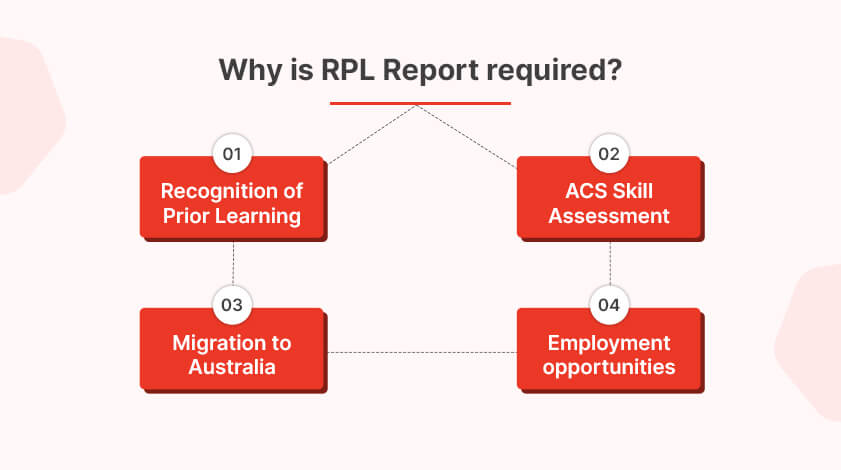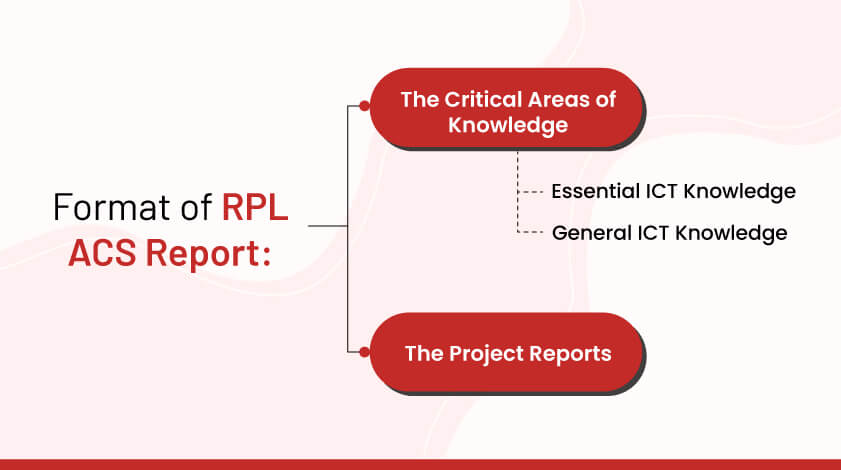What is RPL Report, and why is it required?

What is RPL Report, and why is it required?
Are you an ICT professional looking to migrate to Australia? If so, you’ll need to pass the Australian Computer Society (ACS) skill assessment.
One of the critical documents you’ll need to provide is the Recognition of Prior Learning (RPL) report. The RPL report is a unique document that evaluates your competency and suitability for your chosen occupation based on your work experience and other relevant skills.
The ACS has stringent requirements for the RPL report; preparing it can be daunting. But fear not because this blog post will help you understand the RPL report, who needs it, and why it’s required. We’ll also provide tips on writing a perfect RPL report and explain why hiring professionals is essential to help you with the process.
But first, let’s start with a little bit of background. The ACS is the professional association for Australia’s ICT sector and sets the standards for assessing the skills of ICT professionals who want to migrate to Australia.
The ACS skill assessment process involves submitting various documents and evidence to prove your eligibility and suitability for your chosen occupation. These documents include your academic certificates, transcripts, and work experience.
But what if you don’t hold a formal degree or qualification in ICT, or your profession is not directly related to your nominated occupation? This case is where the RPL report writing comes in. The RPL report allows you to demonstrate your knowledge and skills in your chosen profession based on your work experience and other relevant skills.
Preparing the RPL report can be challenging, but don’t worry; we’ve got you covered. In the following sections, we’ll review everything you need to know about the RPL report, including its format, rules, regulations, and required documents. We’ll also provide tips on how to write a perfect RPL report and explain why it’s essential to seek professional help. So could you sit back, relax, and let’s begin?
Why is RPL Report required?
An RPL (Recognition of Prior Learning) Report get required by the Australian Computer Society (ACS) for those who do not hold a tertiary ICT qualification but have relevant work experience.
It is a critical document for those who want to migrate to Australia or seek a job in the ICT industry. Here are some of the reasons why an RPL Report is necessary:

1. Recognition of Prior Learning
An RPL Report is a tool the ACS uses to recognize the work experience of individuals who do not hold a tertiary ICT qualification. It allows individuals to prove their knowledge and competency in ICT-related fields through their prior work experience.
2. ACS Skill Assessment
The ACS requires all applicants to undergo a skill assessment to meet the standards for migrating to Australia. An RPL Report is an essential part of the skill assessment process for those who still need a relevant tertiary ICT qualification.
3. Migration to Australia
Those who want to migrate to Australia can use an RPL Report to demonstrate their eligibility for an ICT-related job. It allows individuals to prove that their work experience is equivalent to the knowledge gained through a tertiary ICT qualification.
4. Employment opportunities
An RPL Report can also get used to apply for job opportunities in the ICT industry. Many employers in Australia require ACS certification as part of their hiring process, and an RPL Report can demonstrate the competency necessary for those without a tertiary ICT qualification.
Hence, RPL Report is crucial for those who want to migrate to Australia or seek employment in the ICT industry. It allows individuals to demonstrate their knowledge and competency in ICT-related fields through their prior work experience.
Whether you are applying for migration or a job opportunity in Australia, an RPL Report can be a valuable asset in your career.
Who needs ACS RPL Report?
Suppose you do not have a formal ICT qualification, or your profession is not directly related to your nominated occupation. In that case, you will need to submit an RPL report to the ACS.
This submission applies to all ICT occupations, including software and applications programmers, ICT security specialists, ICT project managers, and many others.
The RPL report is optional for those with a formal degree or qualification directly related to their nominated occupation. In this case, you will need to submit academic certificates and transcripts as evidence of your stuff.
To apply for the Australian Computer Society (ACS) skill assessment, the Recognition of Prior Learning (RPL) report get required for ICT professionals who do not have an ICT-related degree qualification. There are two categories of ACS RPL applicants:
1. Those without any tertiary qualifications
2. Those with a non-ICT degree qualification
For applicants with a non-ICT degree qualification, a minimum of six years of work experience as an ICT professional in a relevant field to the nominated occupation ANZSCO code get required.
On the other hand, applicants without tertiary qualifications need eight years of work experience as ICT-skilled employees. Two of those years are optional for relevance to the ANZSCO code.
It’s worth noting that the ACS has strict requirements for the RPL report, and not meeting these requirements can lead to the rejection of your application.
Therefore, it is essential to ensure that you fully understand the ACS guidelines and regulations before preparing the RPL report. It’s also advisable to seek professional help to ensure that your RPL report meets all the requirements and is of a high standard.
Read more: Ultimate guide to writing Career Episode 💼💼
Format of RPL ACS Report
The RPL report is a crucial document that plays a significant role in the Australian Computer Society (ACS) skill assessment process for ICT professionals who do not hold an ICT-related degree qualification. The format of the RPL report is essential to ensure that it meets the ACS guidelines and requirements.
The RPL report consists of two parts:

1. The Critical Areas of Knowledge
The Critical Areas section summarizes your ICT knowledge and skills in the nominated occupation ANZSCO code based on your work experience and other relevant skills.
This section includes two subtopics that should be written in your own words and should not contain any plagiarized material:
I. Essential ICT Knowledge
II. General ICT knowledge
This section should cover all the relevant areas of ICT knowledge and skills related to your nominated occupation.
You should provide evidence of your knowledge and skills in each area based on your work experience and other relevant skills. It’s essential to provide detailed and specific examples demonstrating your competencies.
2. The Project Reports
The Project Reports section of the RPL report describes your work experience in ICT, which should provide evidence of your practical skills and competencies.
You should choose at least two projects from your work experience that best demonstrate your skills and knowledge in your nominated occupation ANZSCO code.
It’s essential to ensure that the Project Reports section get written clearly and concisely, providing all the necessary details of your work experience, including the project objectives, your role in the project, the tools and technologies used, and the outcome of the project.
Please provide specific examples of your work and explain how you have used your skills and knowledge to achieve the project objectives.
The RPL report should be well-organized, with clear headings and subheadings to make it easy to read and navigate. It’s also essential to ensure that the report gets written in clear and concise language, free from grammatical or spelling errors.
The RPL report consists of two parts, the Critical Areas of Knowledge, and the Project Reports. This section should provide an overview of your ICT knowledge and skills in your nominated occupation.
In contrast, the Project Reports should provide evidence of your practical skills and competencies based on your work experience. It’s essential to ensure that the report is well-organized, written in clear and concise language, and meets all the ACS guidelines and requirements.
Rules and regulations of ACS
The ACS has strict rules and regulations for the RPL report, and it’s essential to follow them to avoid rejection. Some of the rules and regulations include the following:
- Candidates must have six years of experience to be eligible for the RPL report.
- Those without appropriate qualifications require an average work experience of at least eight years.
- The ANZSCO code on the ACS website explains how to demonstrate a candidate’s competence.
- Adhering to the ACS guidelines is crucial when writing the RPL report; otherwise, the application will get rejected.
- Seeking professional help for the ACS RPL report is recommended if clarification is needed.
Required documents for RPL Report writing.
To submit an RPL report for the ACS skill assessment, you need to provide the following documents:
- Work reference letter with specific details, including employment start and end dates, position held, duties performed, any previous roles, hours worked per week, country of employment, and a signature of someone with authority from the office.
- Proof for your claims, including official government tax records, employment-related insurance, employment references, superannuation, bank statements with your name and employer’s name, and payslips including your and your employer’s name.
How to apply for ACS Skill Assessment
Following the ACS guidelines to apply for skilled migration to Australia is crucial. The first step is to check your visa requirements and the ANZSCO code information handbook to determine the occupational category to which your work experience closely relates.
Once you have determined your occupational category, the next step is to fill out the online application form on the official ACS website.
If you have inadequate ICT content in your tertiary qualification, you may still apply for ACS skill assessment if you have at least six years of relevant work experience. However, if you have no tertiary qualification, you must present an RPL report for ACS and demonstrate that you have at least eight years of relevant work experience.
It would be best if you met the following actions for a skills assessment in ACS for migration to Australia:
- Acquire the skill assessment done by ACS online.
- Prepare for the PTE examination.
- Submit your EOI (Expression of Interest).
- Wait for ITA (Invitation to Apply).
- After receiving your ITA, get your PCC (Police Clearance Certificate) and medical examination.
- Pay your visa fee.
For the RPL assessment, candidates should submit two project reports via the ACS Project Report Form, mentioning the project undertaken in the last three years and the project undertaken during the previous five years.
The various parameters for RPL for ACS that should get considered for ACS skill assessment include:
- the topology of the network with dimensions and installed assured facilities,
- the different techniques followed during quality assurance and project management,
- the candidate’s assistance with the procedures of design and implementation,
- the strategies used in system analysis and format, the different techniques used in file and database layout and management,
- the programming languages used, various methods adopted for design paradigms, and
- the implementation of internet-based application design and security measures.
Additionally, the managerial activities in ICT should give details about the nature of responsibilities.
Read More: Document checklist for the ACS skilled assessment. 💪💪
Tips for writing perfect ACS RPL Report
Below are some tips to help you write a perfect RPL report for your ACS skill assessment:
- Follow the ACS guidelines and regulations to avoid rejection.
- Provide evidence of your skills, responsibilities, and achievements in your projects.
- Use straightforward language to explain your knowledge and skills.
- Avoid plagiarism and ensure that all the information in the report gets written in your words.
- Ensure that your information is well-organized and easy to read.
Why should I hire professionals to prepare my RPL Report?
In conclusion, preparing an ACS RPL report can be a daunting task, and it is crucial to get it right to ensure a successful migration to Australia.
With the help of a professional service like CDRAustraliaVIP, you can rest assured that your RPL report will meet all the ACS guidelines and requirements, giving you the best chance of a positive assessment.
Their expert writers and engineers have years of experience in the field and can create a high-quality report that showcases your skills and experience in the best possible way.
So, make sure to leave your RPL report to chance. Choose CDRAustraliaVIP and take the first step towards a successful migration to Australia.


